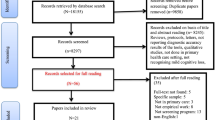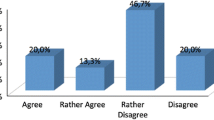Abstract
The IMPACT survey queried physicians, caregivers, payors and members of the general public from 5 European countries (France, Germany, Italy, Spain and the United Kingdom) regarding their opinions towards screening for Alzheimer’s disease (AD) as part of a 30-minute Web-based questionnaire conducted between April and May 2009. A larger proportion of caregivers (84%) and members of the general public (80%) than of physicians (56%) or payors (40%) viewed routine screening for AD as extremely or very important (P<0.001 for caregivers or general public vs physicians or payors). When asked if everyone should be routinely screened for AD at age 65, a smaller proportion of physicians (42%) and payors (44%) than members of the general public (81%) or caregivers (80%) agreed (P<0.001 for caregivers or general public vs physicians or payors). These opinions were generally consistent across the 5 countries for each respondent group. A notable exception was physician respondents from Italy, where most generalists and specialists actually favoured screening. Overall, generalists had a more positive attitude towards screening than specialists. The most frequently cited reason given by those who did not favour routine screening at age 65 was screening inaccuracy. This article discusses these results in relation to what screening is, when to screen and the barriers to screening. Despite the majority of IMPACT respondents being in favour of screening for AD, the evidence to support the introduction of population screening for cognitive impairment is not available; however, the importance of optimal identification of AD and other dementias in primary care should be a priority for community health professionals and payors. In order to do this effectively, further work is required to identify good assessment guidelines for use during opportunistic screening for cognitive impairment in primary care.
Similar content being viewed by others
References
Waldemar G, Dubois B, Emre M, et al. Recommendations for the diagnosis and management of Alzheimer’s disease and other disorders associated with dementia: EFNS guideline. Eur J Neurol. 2007;14(1):e1–26.
Geldmacher DS, Provenzano G, McRae T, Mastey V, Ieni JR. Donepezil is associated with delayed nursing home placement in patients with Alzheimer’s disease. J Am Geriatr Soc. 2003;51(7):937–944.
Geldmacher DS. Alzheimer’s disease: current pharmacotherapy in the context of patient and family needs. J Am Geriatr Soc. 2003;51(5 Suppl Dementia):S289–S295.
Cooke DD, McNally L, Mulligan KT, Harrison MJ, Newman SP. Psychosocial interventions for caregivers of people with dementia: a systematic review. Aging Ment Health. 2001;5(2):120–135.
Carpenter BD, Xiong C, Porensky EK, et al. Reaction to a dementia diagnosis in individuals with Alzheimer’s disease and mild cognitive impairment. J Am Geriatr Soc. 2008;56(3):405–412.
Alzheimer Society. Action on Alzheimer’s Drugs Alliance. Alzheimer’s Society. http://www.handsoffdementiadrugs.org/. Accessed January 2, 2010.
Bamford C, Lamont S, Eccles M, Robinson L, May C, Bond J. Disclosing a diagnosis of dementia: a systematic review. Int J Geriatr Psychiatry. 2004;19(2):151–169.
Corner L, Bond J. Being at risk of dementia: fears and anxieties of older adults. J Aging Stud. 2004;18(2):143–155.
Corner L, Bond J. The impact of the label of mild cognitive impairment on the individual’s sense of self. Philos Psychiatr Psychol. 2006;13(1):3–12.
Vernooij-Dassen MJ, Moniz-Cook ED, Woods RT, et al. Factors affecting timely recognition and diagnosis of dementia across Europe: from awareness to stigma. Int J Geriatr Psychiatry. 2005;20(4):377–386.
Bond J, Corner L, Graham R. Social science theory on dementia research: normal ageing, cultural representation and social exclusion. In: Innes A, Archibald C, Murphy C, eds. Dementia and Social Inclusion. Marginalised Groups and Marginalised Areas of Dementia Research, Care and Practice. London: Jessica Kingsley; 2003:220–236.
National Institute for Health and Clinical Excellence. Outcome of judicial review for NICE guidance on drugs for Alzheimer’s Disease. National Institute for Health and Clinical Excellence. http://www.nice.org.uk/newsevents/infocus/infocusarchive/OutcomeofJR.jsp. Accessed April 23, 2008.
Carpenter B, Dave J. Disclosing a dementia diagnosis: a review of opinion and practice, and a proposed research agenda. Gerontologist. 2004;44(2):149–158.
Fisk JD, Beattie BL, Donnelly M, Byszewski A, Molnar FJ. Disclosure of the diagnosis of dementia. Alzheimers Dement. 2007;3(4):404–410.
Justiss MD, Boustani M, Fox C, et al. Patients’ attitudes of dementia screening across the Atlantic. Int J Geriatr Psychiatry. 2009;24(6):632–637.
Boustani M, Peterson B, Hanson L, Harris R, Lohr KN. Screening for dementia in primary care: a summary of the evidence for the U.S. Preventive Services Task Force. Ann Intern Med. 2003;138(11):927–937.
US Preventive Services Task Force. Screening for Dementia. Recommendations and Rationale. Agency for Healthcare Research and Quality. http://www.ahrq.gov/clinic/3rduspstf/dementia/dementrr.htm. Accessed January 2, 2010.
National Collaborating Centre for Mental Health. Dementia. A NICE-SCIE guideline on supporting people with dementia and their carers in health and social care. The British Psychological Society; 2007. National Clinical Practice Guideline Number 42.
Jones RW, Mackell J, Berthet K, Knox S. Assessing attitudes and behaviours surrounding Alzheimer’s disease in Europe: key findings of the Important Perspectives on Alzheimer’s Care and Treatment (IMPACT) survey. J Nutr Health Aging. 2010;14(7):525–530.
Ashford JW, Borson S, O’Hara R, et al. Should older adults be screened for dementia? Alzheimers Dement. 2006;2(2):76–85.
Holland WW, Stewart S, Masseria C. Policy Brief. Screening in Europe. World Health Organization on behalf of the European Observatory on Health Systems and Policies. http://www.euro.who.int/document/E88698.pdf. Accessed January 2, 2010.
Cochrane AL, Holland WW. Validation of screening procedures. Br Med Bull. 1971;27(1):3–8.
Iliffe S, Robinson L, Brayne C, et al. Primary care and dementia: 1. diagnosis, screening and disclosure. Int J Geriatr Psychiatry. 2009;24(9):895–901.
World Alzheimer Report 2009 Executive Summary. Alzheimer’s Disease International. http://www.alz.co.uk/research/files/World%20Alzheimer%20Report%20Executive%20Summary.pdf. Accessed January 2, 2010.
Brodaty H, Low LF, Gibson L, Burns K. What is the best dementia screening instrument for general practitioners to use? Am J Geriatr Psychiatry. 2006;14(5):391–400.
Donnelly K, Donnelly JP, Cory E. Primary care screening for cognitive impairment in elderly veterans. Am J Alzheimers Dis Other Demen. 2008;23(3):218–226.
Grober E, Hall C, Lipton RB, Teresi JA. Primary care screen for early dementia. J Am Geriatr Soc. 2008;56(2):206–213.
Harvan JR, Cotter V. An evaluation of dementia screening in the primary care setting. J Am Acad Nurse Pract. 2006;18(8):351–360.
Kilada S, Gamaldo A, Grant EA, Moghekar A, Morris JC, O’Brien RJ. Brief screening tests for the diagnosis of dementia: comparison with the mini-mental state exam. Alzheimer Dis Assoc Disord. 2005;19(1):8–16.
Mathuranath PS, George A, Cherian PJ, Mathew R, Sarma PS. Instrumental activities of daily living scale for dementia screening in elderly people. Int Psychogeriatr. 2005;17(3):461–474.
Milne A, Culverwell A, Guss R, Tuppen J, Whelton R. Screening for dementia in primary care: a review of the use, efficacy and quality of measures. Int Psychogeriatr. 2008;20(5):911–926.
Trenkle DL, Shankle WR, Azen SP. Detecting cognitive impairment in primary care: performance assessment of three screening instruments. J Alzheimers Dis. 2007;11(3):323–335.
Author information
Authors and Affiliations
Corresponding author
Rights and permissions
About this article
Cite this article
Bond, J., Graham, N., Padovani, A. et al. Screening for cognitive impairment, Alzheimer’s disease and other dementias: Opinions of European caregivers, payors, physicians and the general public. J Nutr Health Aging 14, 558–562 (2010). https://doi.org/10.1007/s12603-010-0268-6
Received:
Accepted:
Published:
Issue Date:
DOI: https://doi.org/10.1007/s12603-010-0268-6




